
One of the facets we know for sure about God’s character is that He is incredibly personal and deeply concerned about our family lives. The best way to have a family that is woven together is to communicate, not just about spirituality, but also the everyday stuff from a God-honoring perspective.
In this age of increasing isolation, in which younger people drift further and further into the digital world of video games and gadgets inside their heads, there is perhaps no better time for us to look into options for leisure activities that bring a family together.

I remember that when I was growing up as a young child, simple card games like Old Maid and Happy Family, as well as board games like Scrabble, Snakes and Ladders, and Monopoly, brought us so much joy at spending time together. Nowadays, most gamers will likely look upon them with disdain, but I feel we ought to value those times we had in the past.
The board game industry has bloomed lately, and there is such variety to them these days that there are now two distinct groups, known as Ameritrash and EuroGames. This is not the place to go into the differences in detail, but typically, Ameritrash games tend to emphasise conflict, theme, and storyline more, while EuroGames tend to favour tight designs in which strategy plays a more prominent part than luck. EuroGames are more focused on economics and direct conflict is kept to a minimum.
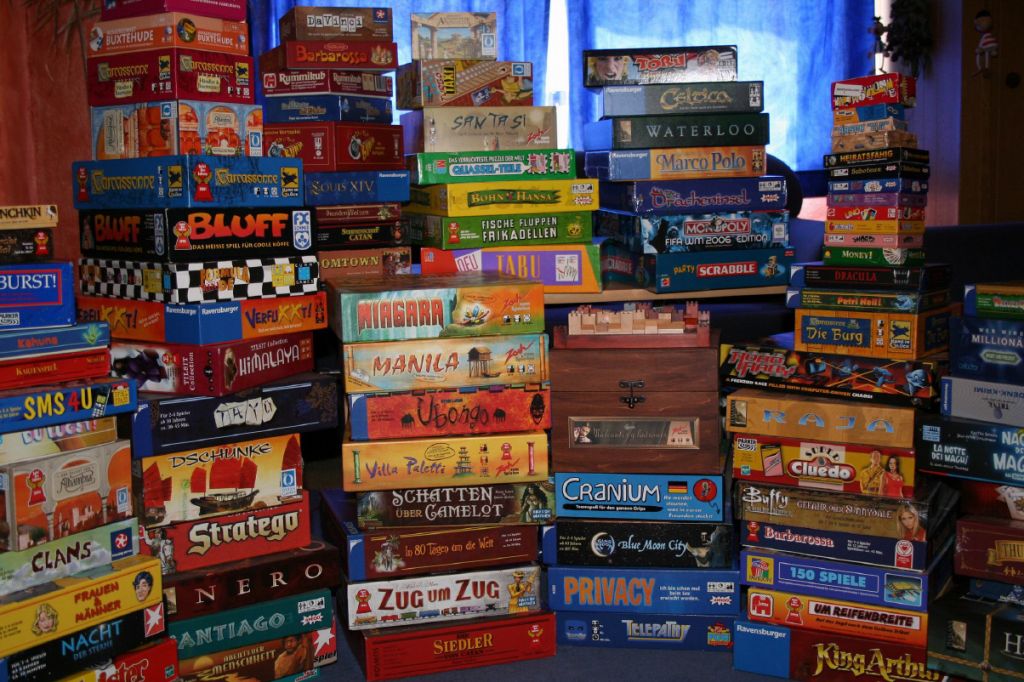
As a family activity, board games have much to offer, and it was a discovery to find that so many board-gamers are Christians. In their very design and structure, board games necessitate participation from each player as a group. Unlike isolative video games, they function primarily as a social activity, and much of the fun and joy comes from the players’ interaction with each other, whether directly like in Ameritrash games or indirectly like in EuroGames.
They inculcate family and social values in players such as patience and taking turns. Cooperative games such as Forbidden Island, in which players work together to find treasures and escape a sinking island in order to beat the game, build up teamwork and communication. Dexterity games like Ghost Blitz and Dobble train up a child’s mental agility and visual perception.
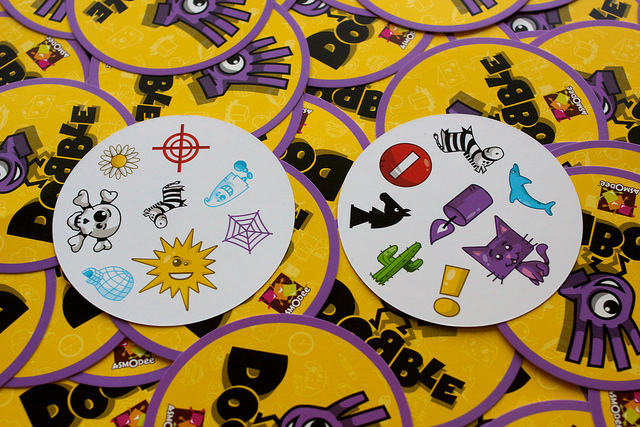
Most strategic games coach players in skills like critical thinking and planning ahead. Math-y games like those designed by Reiner Knizia give opportunities for players to practice their math skills in their decision-making. Well-designed games that offer players multiple options during each turn will teach them about making tough choices, as well as younger players about actions and consequences, skills which they can later put into practice in real life.
Some board games can also be a litmus test of the family’s cohesiveness. Families that can play a conflict-driven board game and not end up arguing is a strong family, while one that cannot play such a game without ending up in heated arguments each time says something about that family. Ultimately, such board games also teach players on how to handle losses in a mature manner.
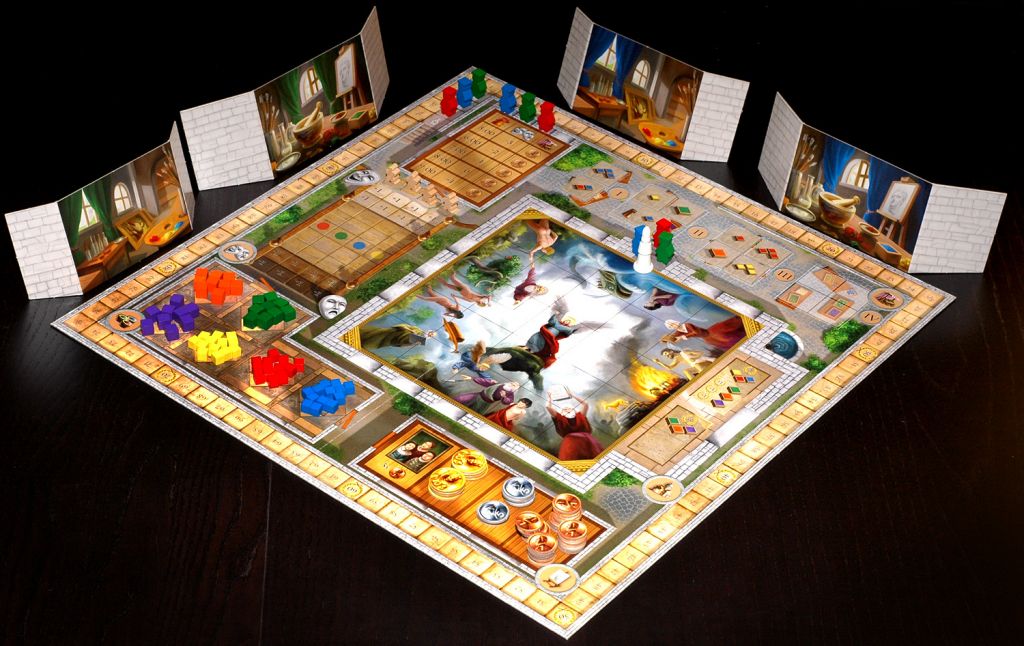
As a Christian, I was pleasantly surprised to find that many card and board games these days have also a theme that is strongly-related to Christian History or the Bible. Some of the ones taking inspiration from Christian History are Ora et Labora (in which players are managing a monastic community), Biblios (contending to have the finest Scriptorum), Fresco (players take on roles as master painters working to restore a fresco in a Renaissance church) and Here I Stand (exploring the conflict between the various factions, including the Ottomans and Hapsburgs, during the Reformation years).
Beyond this, many board games take inspiration from events in the Bible itself. Some examples are (all of which can be found either in local Christian bookstores or in local board game cafes):
Apples to Apples Bible Edition
Apples to Apples is a popular party game consisting of two decks of cards: Things and Descriptions. Each round, the active player draws a Description card (which features an adjective like “Hairy” or “Smarmy”) from the deck, then the other players each secretly choose the Thing card in hand that best matches that description and plays it face-down on the table. The active player then reveals these cards and chooses the Thing card that, in his opinion, best matches the Description card, which he awards to whoever played that Thing card. This player becomes the new active player for the next round. Once a player has won a pre-determined number of Description cards, that player wins.
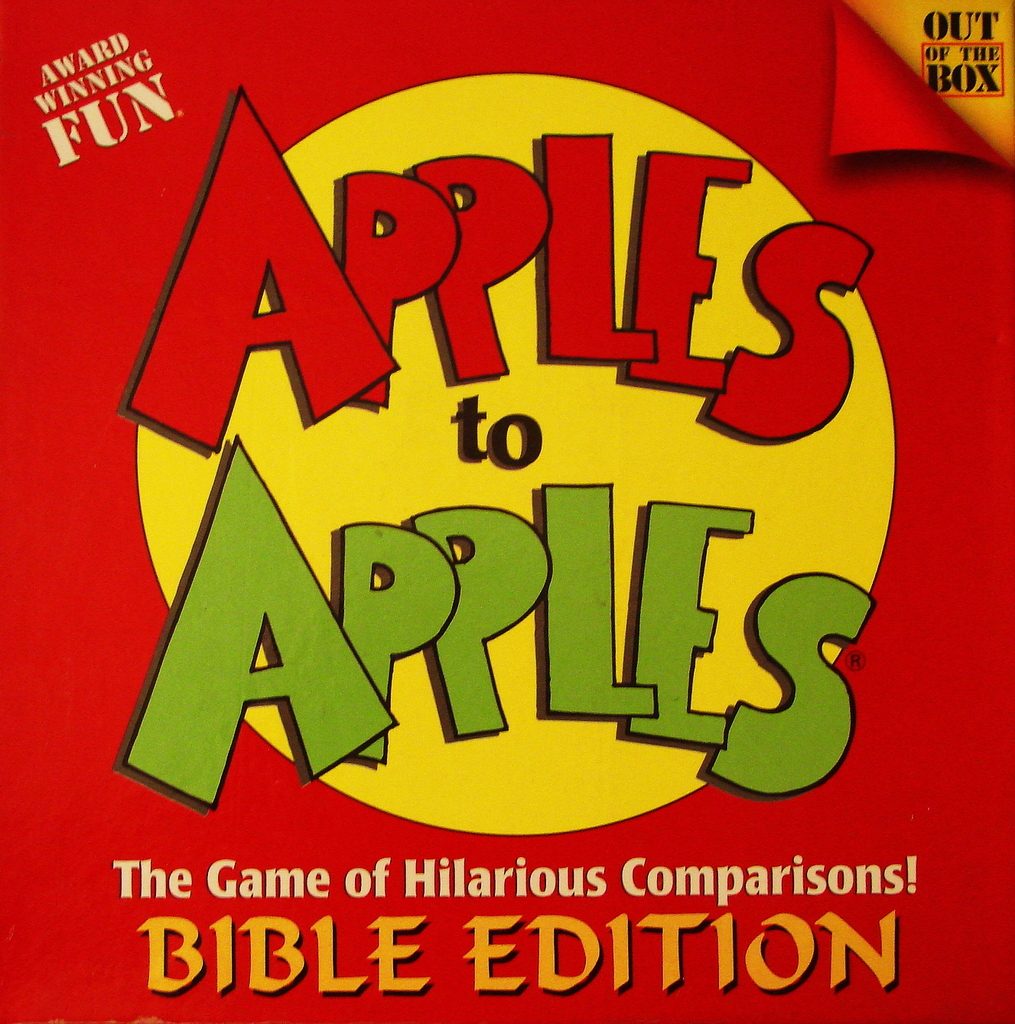
From Tom Vasel’s review: In The Bible edition, the red apple cards list a variety of objects, with a Bible verse printed where the description normally is. The cards include a variety of objects found throughout Scriptures, such as idols, a banquet, leprosy, rabbis, the Star at Bethlehem, prayer, fallow ground, and Passover. Biblical ideas such as “to be blessed”, “calming a storm”, and “sleeping in a manger” are included, as well as famous people, from David and Sampson to Nicholas Copernicus and St. Patrick. Most of the green cards contain adjectives that could be found in any of the games, such as disgusting, expensive, and strange; but a few probably only work in the religious setting – such as virtuous, righteous, and full of grace.
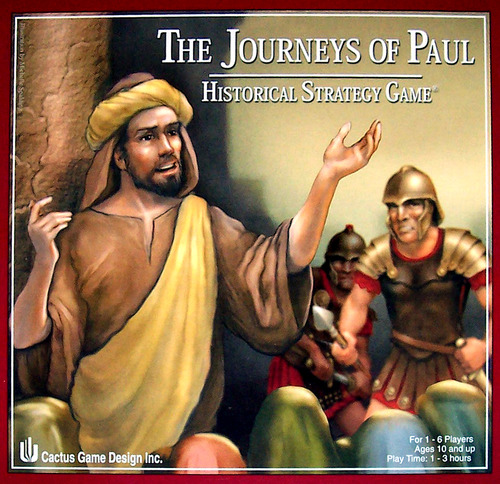
This game begins immediately after St. Paul completed his famous four journeys during which he spread the Gospel and established the first churches in the Roman Empire. Each player in the game is a missionary who, like Paul, travels through the Roman Empire attempting to start churches in several key cities. The game simulates the difficulties and challenges confronted by Paul and his companions.
Settlers of Canaan
Settlers of Canaan is a retheming of the popular board game The Settlers of Catan. It takes place in the territory of Canaan off the coast of the Great Sea. Each Player represents a tribe of Israel as they seek to settle the land of Canaan. The time period of the game spans the time of Joshua’s conquests of Canaan (Joshua), the turbulent years ruled by judges (Judges) through the choosing and crowning of King David (I & II Samuel).
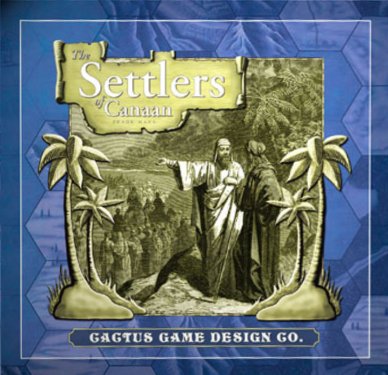
The game uses the same basic mechanics as Settlers of Catan but adds some unique elements, similar to the Historical Scenarios expansion for the original game. In the case of this game, players build the wall of Jerusalem by contributing bricks. The player who contributes the most bricks earns victory points and the right to use a special “rule-breaking” power of his/her choosing. This is contested in the same manner as “the longest road” from Settlers.
Kingdom of Solomon
King Solomon presided over a golden age of peace and prosperity in ancient Israel. During this time Solomon instituted an unprecedented building program. As one of Solomon’s chief governors in this game, you must procure materials and oversee construction of buildings and roads across the land for the glory of Solomon. You will also help to construct the Temple, one of the wonders of the ancient world.
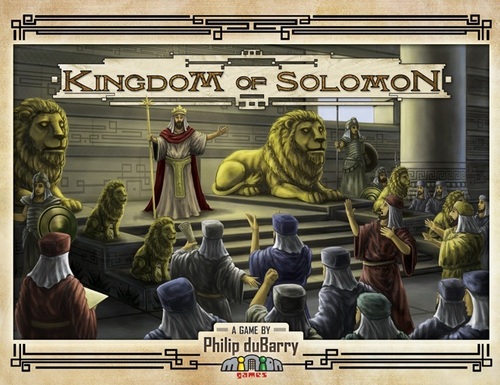
Kingdom of Solomon is probably the heaviest game in this list and by many players’ appraisal, probably the best Biblically-based game currently available in the Malaysian market. It is a worker-placement game with a few new twists and turns. Do you claim a resource space, an action space or throw in all your remaining pawns to grab a powerful Bonus Space? Will you spend your resources to extend Solomon’s kingdom, take some points in the Market or add to the Temple? These and many other choices await you in this highly interactive game.
Noah
This game was designed by the respected pair of board game designers, Bruno Cathala and Ludovic Maublanc. Noah is a game of simple rules and scoring system but deep enough to teach children skills in addition, and basic pattern recognition like matching while still offering strategic play. The components are cute and stay somewhat true to the theme, saving animals from a flood by putting them in pairs and loading them into ferries on their way to an Ark.
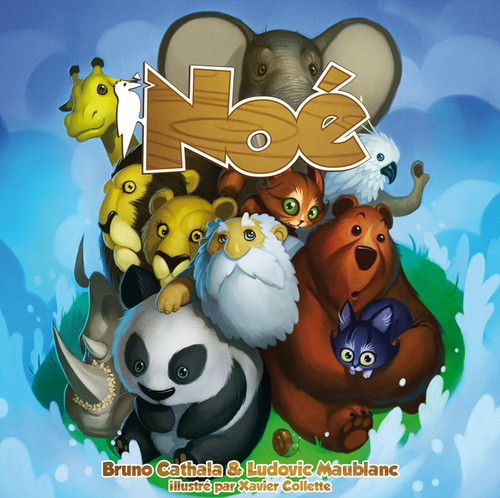
Each round, players start with eight animal cards in hand; five ferries are laid out in a circle, with one animal placed on board from the top of the deck. Noah himself stands on one ferry. On a turn, a player plays one card from hand onto the ferry where Noah is located, following two rules: (1) the total weight of all animals on board cannot exceed 21 and (2) animals on a ferry must be placed either in alternating gender order or must be all of the same gender.
After placing an animal, the player moves Noah to a different ferry; if he played a female animal, Noah goes to either adjacent ferry, while if he played a male, Noah goes to either ferry on the other side of the circle. If a player can’t legally play an animal, he must first take in hand all the animals on the ferry where Noah is located, and then play an animal.
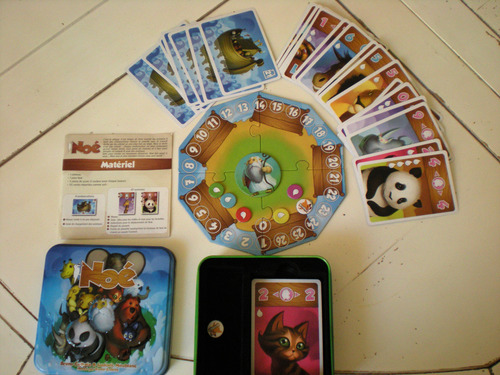
Some additional rules allow players to gain an advantage or mess with other players. The round ends when a player runs out of cards in hand or a fourth ferry launches. Players receive penalty points for cards still in hand, scored according to the number of tears on each card, those tears representing Noah’s sadness at the animal being left behind. Then players shuffle all the animal cards and begin a new round. The player with the fewest points after three rounds wins!
Though they are not be-alls, and outdoor activities are equally important, such activities that bring families together in a healthy manner are a valuable part of family life as well.
|Share The Good News|
Jason Law
NOTE: All board game information as found on boardgamegeek.com




Leave a Reply